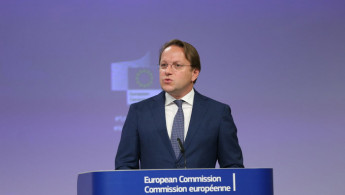EU seeking to 'correct' controversial Bosnia genocide denial legislation
High-level European Union figures are making efforts to "correct" a recent measure implemented in Bosnia and Herzegovina to ban people from denying the Srebrenica genocide.
The EU figures consider the law, which makes denial of the genocide punishable by up to five years in prison, could spark a new war in the Balkans, The Guardian reported on Wednesday.
The Srebrenica genocide saw over 8,000 Bosniak Muslims slaughtered by Bosnian Serb forces in July 1995. As many as 31,583 Bosniak Muslim civilians were killed in the war between 1992 and 1995.
The Serb sitting on Bosnia's collective presidency, Milorad Dodik, has faced criticism recently with some claiming he is attempting to secede through efforts to pull the largely ethnically Serb area of Bosnia out of federal institutions.
Bosnia's Bosniak, Serb and Croat communities are each represented with one seat on the presidency.
Dodik, who has long supported succession, alleges the division of authority is unequal in Bosnia and believes this was demonstrated by then-Office of the High Representative chief Valentin Inzko banning genocide denial in July. Dodik also considers the move to ban genocide denial to be against democracy.
The Office of the High Representative is an international body designed to help put in place the deal that stopped the Bosnian War of the 1990s.
The attempts by Dodik to boost the authority of the Serb-speaking Republic of Srpska within Bosnia have been slammed, with some suggesting this could provoke another conflict.
However, Hungarian Olivér Várhelyi, the EU's enlargement commissioner, reportedly has a different understanding, according to minutes of a 25 November meeting seen by The Guardian.
Várhelyi, who had been speaking with Europe's representatives to Sarajevo, explained his "frank assessment" was now that ex-High Representative Inzko "was to blame for the current political crisis".
Várhelyi also claimed the Austrian diplomat had caused his old position to be "delegitimis[ed]".
Várhelyi informed other EU figures that Bosniak officials expressed they were open to addressing the matter legislatively – a move that may be able to bring Dodik and Bosnia's Serb republic on board again.
"Until Europe makes more of an effort to remember, acknowledge and learn from what happened in Bosnia, nothing can change" https://t.co/cGqX1rV63c
— The New Arab (@The_NewArab) July 10, 2020
German politician Christian Schmidt replaced former High Representative Inzko in August. He backs the implementation of a new, less contentious law on denying genocides.
"The High Representative takes the issue of glorification and war crimes very seriously," according to the Office for the High Representative.
Schmidt's "main focus, however, is on the clear need to create the basis for a parliamentary legislative process through a broad social discussion involving social and religious stakeholders," the body added.
According to the statement, Schmidt cautioned not to politicise the matter.





 Follow the Middle East's top stories in English at The New Arab on Google News
Follow the Middle East's top stories in English at The New Arab on Google News


